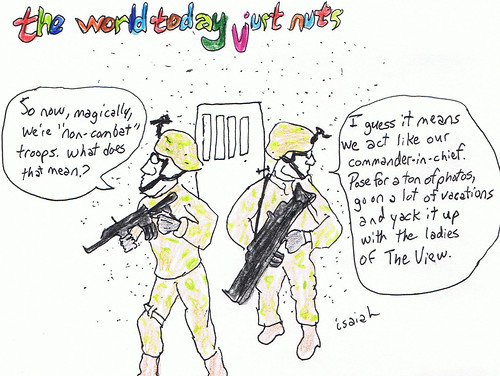Oh, wait. That wasn't his war speech. That was his economy speech, given in Detroit at the Chrysler plant last month. His war speech was remarkably like Bully Boy Bush's as he declared the end to all "combat missions" in Iraq at the end of this month.
What a crock. And probably best captured in Isaiah's The World Today Just Nuts "Non-Combat Troops."

As The Financial Times of London's Daniel Dombey observed to Diane Rehm on Friday's The Diane Rehm Show (NPR), "I have to say they talk a lot about the combat mission ending. I would say a large part of that is just semantics. They're still going to be involved in counter-terrorism, they're still going to be an essential part in terms of communication and logistics and transport -- all really difficult actions against al Qaeda or against insurgents are going to likely rely on US forces for some time to come, I would say." Or take Michael Jansen's (Irish Times) observation, "Iraq has just begun to receive some of the equipment it needs to defend the country. Eleven of 140 US battle tanks have arrived but crews will not be trained and the rest of the tanks will not be in service until mid-2012. Iraq has no independent air cover, an essential component of any defence strategy. Last March the government contracted to purchase 18 US F-16 fighter jets, but these are not set for delivery before 2013."
We're not saying no one's leaving, mind you. ABC left. CBS left. NBC left. The San Francisco Chronicle left. Just last week, Chris Hill left.

But most aren't leaving. A question was posed Thursday at The Common Ills: "Trivia question: Name the PRI program and guest that apparently will be the only ones to discuss the staging areas around Iraq that the US will continue to use 'after' the war? If that question is too hard, the guest was . . . Linda Bilmes. Is she going to be the only one to talk about it?" Apparently she is and you can refer to the August 4th broadcast of PRI's The Takeaway (excerpt in the August 4th snapshot) or you can refer to Bilmes' column in today's San Francisco Chronicle with specific attention given to this:
Getting yet what a big liar Barack is? How he is, indeed, worse than even Bully Boy Bush -- and who ever would have thought that even possible?
Liars, fools and hopium addicts (hey, Jar-Jar Jarad!) are the only ones who insist the illegal war is about to end. And the same groupings also want to tell you Iraq has seen progress. Just last week, outgoing US Ambassador Hill was insisting that in an interview with Steve Inskeep on today's Morning Edition (NPR).
Steve Inskeep: As you prepare to leave Baghdad, do you leave Iraq thinking that this a country that still could collapse?
Chris Hill: Actually, I look at this in pretty optimistic terms. Its obviously a complex country. Its where the Shia world meets the Sunni world. Its where the Turkmen world meets the Arab world. There are a lot of complexities here. And I think its a very important country to our interests, and I dont mean that from an ideological point of view. I mean that from the point of view of looking at a map. So I think there's a lot at stake here, but I think its also a place thats going in the right direction. They signed 11 major oil deals while I was here. I mean these are oil deals with all the major oil companies. Indeed, they are oil deals with all the companies from all the countries who are permanent members of the U.N. Security Council. So Iraq is no longer just Americas problem; other countries have a real stake in its success.
Oh well, as long as they signed oil contracts then let's all call it a success! Because Iraq is populated with oil wells and empty of people, right? Iraqis live in Iraq? Goodness. You'd never know it to hear Chris Hill rattle away. (For an indepth critique of Chris Hill's crap, see the August 11th snapshot.)
There's been no progress. Violence continues, electrical outtages continue, the lack of potable water continues, the Iraqi refugee crisis continues -- It all continues. Months away from the eighth anniversary of the start of the illegal war and it all continues.
And as Chris Hill fled Iraq, the political stalemate continued.
March 7th, Iraq concluded Parliamentary elections. The Guardian's editorial board notes, "These elections were hailed prematurely by Mr Obama as a success, but everything that has happened since has surely doused that optimism in a cold shower of reality." 163 seats are needed to form the executive government (prime minister and council of ministers). When no single slate wins 163 seats (or possibly higher -- 163 is the number today but the Parliament added seats this election and, in four more years, they may add more which could increase the number of seats needed to form the executive government), power-sharing coalitions must be formed with other slates, parties and/or individual candidates. (Eight Parliament seats were awarded, for example, to minority candidates who represent various religious minorities in Iraq.) Ayad Allawi is the head of Iraqiya which won 91 seats in the Parliament making it the biggest seat holder. Second place went to State Of Law which Nouri al-Maliki, the current prime minister, heads. They won 89 seats. Nouri made a big show of lodging complaints and issuing allegations to distract and delay the certification of the initial results while he formed a power-sharing coalition with third place winner Iraqi National Alliance -- this coalition still does not give them 163 seats. They are claiming they have the right to form the government. In 2005, Iraq took four months and seven days to pick a prime minister. It's now 5 months and 8 days.
Progress? Really? The second Parliamentary election's already taking longer than the 2005 election to seat a government. That would appear to be your first and most obvious indicator of a failed-state and a regression -- not progression.